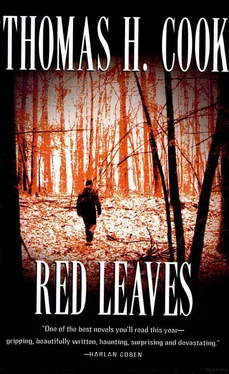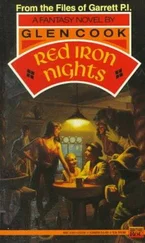"Sounds like it," I answered. I glanced at my watch again. "I have to get home, Warren."
"Yeah, sure," Warren said. "I'll just hang around, finish my beer."
I got to my feet. "Just remember, if the cops talk to you again, be careful what you say."
Warren smiled. "You can count on me," he said.
TEN
Keith was in his room when I arrived at home.
"How'd he take it?" I asked Meredith. "My not wanting him to make deliveries for a while."
"I cant tell," Meredith answered. She was in the kitchen, standing at the cutting board, running a knife across the fleshy surface of a late-summer tomato. Its juices ran out onto the board and added a tang to the air. "He's just wears that same, flat face. No emotions. 'Flat affect'—that's what they call it."
"Who calls it that?"
"Psychologists."
"He's a teenager," I said. "All teenagers have 'flat affect.'"
She stopped slicing. "Did you?"
It was an unexpected question, but one I thought I could answer with a swift, decisive no. Then I recalled the moment when I'd been told of my mother's death, the way her car had plunged off a thirty-foot bridge. She'd been impaled on the steering wheel, a fact my father had not been reluctant to divulge, and yet, for all the gruesome nature of her death, I had simply nodded and walked upstairs to my room, turned on the phonograph, and listened to the album I'd just borrowed from a friend. Before now, I'd considered such behavior merely my way of choking off my grief, but now, thinking through it again, I couldn't be sure that I'd actually felt my mother's death as viscerally as I might have expected. At the funeral, for example, I'd sat silently beside my equally silent father, toying with my sleeve, while Warren sobbed uncontrollably, his fleshy shoulders shaking, huge tears running down his fat cheeks.
"Maybe I did," I admitted. "When my mother died, I didn't exactly fall apart."
"But I thought you loved your mother," Meredith said.
"I think I did," I said. "I mean, she was the one who wanted me to go to college, scrimped and saved."
I remembered how, even in the midst of our worsening financial situation, she'd hoarded a few pennies from each month's budget. She'd called it my college fund and had sworn me to secrecy, made me promise not to tell Warren and especially not to tell my father. It couldn't have been very much money, of course, and after her death I'd always assumed that my father had found it buried deep inside a closet or on the top shelf of the kitchen cabinet, then spent it in his usual way, probably on a final bottle of expensive brandy.
"I should have been really hurt by her death," I said. "But I don't remember being all that upset about it." I recalled the slow, deliberate tone my father had taken when he broke the news, his voice even, emotionless. He might as easily have been informing me of a sudden change in the weather. "My father didn't seem all that upset, either," I added.
Meredith looked as if I'd just revealed a formerly hidden aspect of my character. "Maybe that's where Keith gets it then." She began slicing the tomato again. "Anyway, it's not supposed to suggest anything, this flat affect behavior."
"What would it suggest?"
"You know, that he's a monster."
"Jesus, Meredith, Keith's not a monster."
She continued to slice the tomato. "That's what I just said."
I sat down at the kitchen table. "The cops talked to Warren. He told them Keith was in a mood that night."
Meredith spun around, the knife frozen in her hand. "What a fucking idiot," she snapped.
"Yeah."
"Goddamn it!"
"I know. I told him the next time to think before he spoke."
"As if he could," Meredith said hotly. "In a mood, Jesus Christ!" She seemed to smolder as she stood, knife in hand, glaring at me. "What's wrong with him, anyway? Is he just stupid, or is it something worse?"
"Something worse?"
"I mean, is he trying to get Keith in trouble?"
"Why would he do that?"
"Oh, come on, Eric." She put down the knife. "He's jealous of you. He always has been. You've always been the favorite. To your mother, but not just her. I mean, to this day, your father doesn't care if Warren comes by to see him. He never thinks about Warren. And then there's the fact that you have a wife, a son, a real family. What does Warren have? Absolutely nothing."
All of this was true, but I had never considered its corrosive effects before, the terrible possibility that all the years of feeling small and unsuccessful, of living in a tiny rented house alone, might have corrupted some aspect of my brother's heart, poisoned him against me so that he secretly reveled in my current troubles, perhaps even sought to deepen them.
"Do you really think Warren would deliberately try to implicate Keith in this thing with Amy?"
"Yes," Meredith answered bluntly.
The sheer force of her reply, the world of bitter envy it unearthed, was more than I could accept. "I just can't believe he'd do something like that, Meredith," I said.
Her gaze was withering, and beneath it I felt like a hopelessly clueless child. "You don't have any idea how malicious people really are, Eric," she said. "And I don't think you ever will."
There was no way to answer such a charge, and so I merely shook my head, walked into the living room, and turned on the television. The local news was just beginning. The lead story, once again, was about Amy's disappearance.
There'd been no developments in the case, the reporter said, but the police were busy following a few "promising leads."
Promising leads.
I glanced back to where Meredith stood at the entrance of the kitchen, her eyes fixed on the television screen.
"Promising leads," she repeated sarcastically. "I wonder how many of them came from dear old Warren."
I turned back to the television. By then, the report had gone live, with Peak and Kraus before a bristling array of microphones, Peak out front, Kraus standing stiffly behind him. For the next few seconds, Peak brought reporters up to date. The police, he said, were following a number of leads. A hotline had been established, and some of the information gained from callers appeared "credible."
"Credible," Meredith scoffed as she sat down on the sofa beside me. "Not if it came from Warren."
"Please, Meredith," I said quietly.
Peak ended his update by saying that the Giordanos were being fully cooperative, that they absolutely were not suspects in Amy disappearance, and that they'd recently turned over the family computer so police could see if Amy might have been contacted by "suspicious individuals" on the Internet.
With that, Peak turned, and started to go back into police headquarters.
"Do you have a suspect?"
The question had come from the crowd of reporters gathered on the steps of the building, but when he turned, Peak appeared to recognize the reporter who'd asked it.
"We're looking at several people," Peak said.
"But do you have one suspect in particular?" the reporter asked.
Peak glanced at Kraus, then faced the camera. "Were building a case," he said. "That's all I can tell you."
Then, almost like an apparition, he was gone.
"Building a case," Meredith said. She looked at me worriedly. "Against Keith."
"We don't know that," I told her.
She looked at me again in the way she'd looked at me when I'd denied my brother's ill intent. "Yes, we do," she said.
We had dinner an hour later, Keith slumped mutely in his chair, toying with his food, barely eating it. Watching him, I could not imagine Peak and Kraus building a case against him. In some sense, he appeared too pale and skinny to be considered a threat to anyone. But more than his physical weakness argued against his having done anything bad to Amy Giordano. Brooding silently at the table, aimlessly picking at his food, he gave off a sense of being innocuous, far too listless and desultory to have summoned the sheer malicious impetus required to harm a child. My son could not have hurt Amy Giordano, I decided, because he lacked the galvanizing energy necessary for such an act. He was too drab and ineffectual to be a child killer.
Читать дальше












